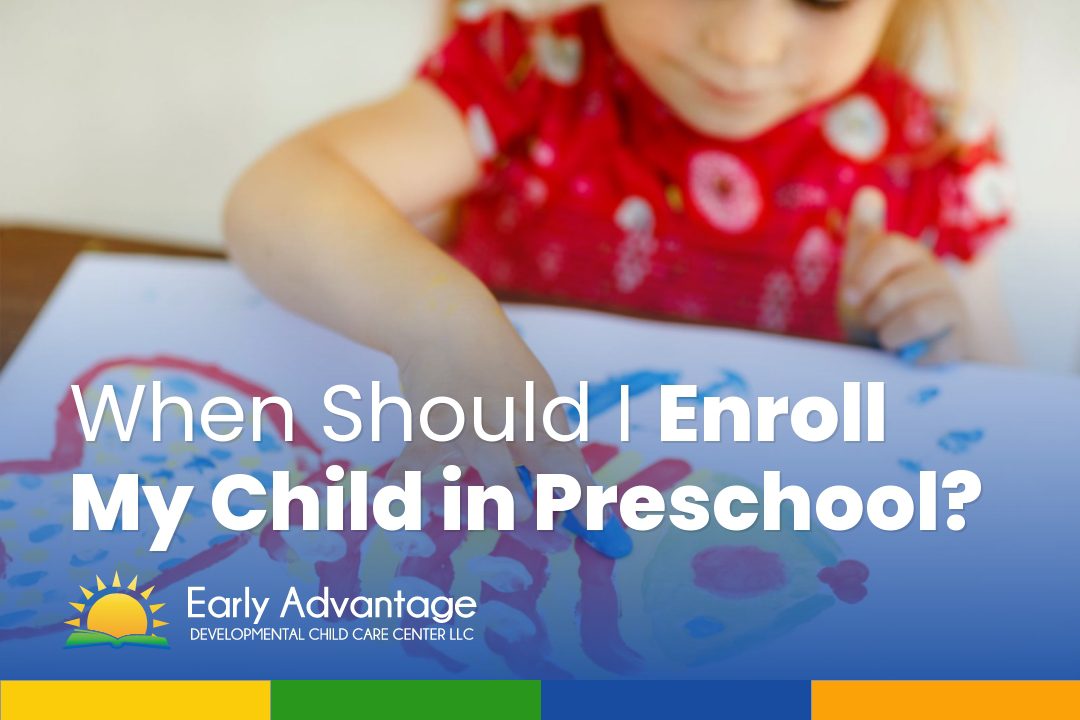The Right Start for Early Childhood Education
Enrolling a child in preschool is a significant decision that can have a profound impact on their early development and educational journey.
Preschool education is crucial in preparing children for the academic, social, and emotional challenges they will encounter in their formative years.

As a parent, it’s natural to wonder, “When should we enroll our child in preschool?” Understanding the factors contributing to preschool readiness and considering various aspects of preschool programs can help you make an informed decision that sets your child up for success.
In this article, we will explore the signs of preschool readiness, the appropriate age for enrollment, and the pros and cons of early preschool enrollment. By delving into these considerations, you will gain valuable insights to help determine when you should enroll your child in preschool.

Preschool Readiness
Ensuring your child is ready for preschool is essential for their smooth transition and positive experience.
Several signs can indicate a child is prepared to embark on this new educational journey. Observing these indicators will help you gauge their readiness effectively.
One crucial aspect to consider is your child’s age and developmental milestones. Most preschools typically cater to children within a specific age range. While age alone should not be the sole determinant, it can provide a general guideline for assessing readiness.
Additionally, observing your child’s cognitive, social, and emotional development is equally important. Are they able to follow simple instructions, engage in cooperative play, and express their needs and emotions effectively? Is your child potty trained and able to advocate when they need to use a restroom? These factors contribute to their readiness for the structured and interactive environment of preschool.
Language and communication skills are vital for preschool readiness. Literacy skills, including vocabulary, listening comprehension, and the ability to communicate their thoughts, lay a solid foundation for their educational journey. Furthermore, basic skills such as fine motor skills (using pencils, scissors, etc.) and self-help skills (such as using the restroom independently) contribute to their overall readiness.
It’s also essential to consider your child’s social skills before they attend preschool. Preschool provides a valuable opportunity for children to interact with their peers and develop important social competencies. Being able to share, take turns, and engage in cooperative play are signs your child is developing the necessary social skills for a preschool setting.
While preschool readiness encompasses various factors, it’s important to remember each child develops at their own pace. What matters most is a holistic assessment of their abilities, considering their unique strengths and challenges. By carefully observing your child’s developmental milestones and assessing their cognitive, social, and emotional skills, you can make an informed decision regarding their readiness for preschool.

Choosing the Right Preschool
Selecting the right preschool for your child is a crucial decision that can greatly impact their early education and overall development.
With so many options available, it’s important to consider everything to ensure you choose a preschool that aligns with your child’s needs, your requirements and provides a nurturing and enriching environment.
Key considerations to help guide your decision-making process
Carefully consider some of the factors we’ve outlined in this article and assess how they align with your child’s unique needs. By doing so you can make an informed decision when choosing the right preschool. Remember, selecting a preschool that provides a supportive and stimulating environment can help to set the foundation for your child’s love of learning and future educational success.

Preschool Enrollment Factors
Enrolling your child in preschool involves several important factors to help ensure a smooth and successful transition.
By understanding and addressing these factors, you can make the best decision for you and your child in regard to the timing of your child’s preschool enrollment. Here are key factors to consider:
- Developmental Readiness
Assess your child’s developmental milestones, including their cognitive, social, and emotional skills. Look for signs of readiness such as independence, ability to follow instructions, and readiness to engage in group activities. It’s important to ensure your child is prepared to participate actively and benefit from the preschool environment. - Age Considerations
Take the recommended age range for preschool enrollment into account. Most programs have a specific age requirement, often starting around two to three years old. However, remember that every child develops at their own pace, so it’s crucial to consider their individual readiness rather than solely relying on age. - Personal Readiness
Consider your child’s personality and temperament. Some children may thrive in a structured and social preschool setting, while others may need more time to adjust. Assess their comfort level with separation from caregivers, ability to adapt to new environments, and willingness to engage with peers. - Family Dynamics
Consider your family’s unique circumstances, including work schedules, availability for drop-offs and pick-ups, and the support system available to you. Ensure that enrolling your child in preschool aligns with your family’s needs and can be accommodated within your daily routines. - Preschool Program Availability
Explore the availability of programs in your area. Consider factors such as program length (half-day or full-day), frequency (number of days per week), and any specific program features or offerings that align with your child’s interests or needs. - Waiting Lists and Enrollment Deadlines
Some preschools may have waiting lists or specific enrollment deadlines. It’s important to research and plan ahead to secure a spot in your preferred preschool program. Be aware of any application processes, required documents, as well as important dates.

Transitioning to Preschool: A Smooth Adjustment for Your Child
Transitioning to preschool is an important milestone in your child’s educational journey.
It marks a significant shift from home or informal care settings to a structured learning environment. Here are a few helpful steps to consider to ensure a smooth transition.
- Prepare Your Child
Start by familiarizing your child with the concept of preschool. Talk about what to expect, read books about starting school, and engage in pretend play to mimic classroom activities. This helps build anticipation and alleviate any anxieties. - Visit the Preschool
If possible, take your child for a visit to the preschool before the official start date. Familiarize them with the surroundings, introduce them to teachers and staff, and allow them to explore play areas. This can help your child feel more comfortable and establish a sense of familiarity. - Establish a Routine
Prior to starting preschool, gradually introduce a daily routine that aligns with the preschool schedule. By setting consistent wake-up and bedtimes, establishing meal and snack times, and incorporating activities that mirror the preschool routine, your child can adjust to a structured schedule more easily. - Opportunities for Socialization
Arrange playdates or join local parent-child groups to provide your child with opportunities to interact with peers. Socializing before starting preschool helps in enhancing social skills, boosting confidence, and making the transition to preschool smoother. - Communicate with the Teacher(s)
Establish open communication with your child’s preschool teachers. Share any relevant information about your child’s interests, needs, or anxieties. Collaborating with teachers will help them understand your child better and tailor their approach to support their transition. - Transition Period
Some preschools offer a transition period where children attend for shorter durations initially and gradually increase their time at school. If this is an available option, take advantage of it as it allows your child to adjust gradually and become familiar with the new environment. - Emotional Support
Provide emotional support to your child during this transition. Validate their feelings, listen to their concerns, and offer reassurance. Encouraging them to express themselves and being patient as they adapt to the new routine is crucial.
Remember, every child adjusts differently, and it’s normal for them to experience a range of emotions during this transition. With patience, understanding, and support, your child will gradually settle into their new preschool routine and begin to thrive in their early learning journey.

Do you find yourself asking, when should I enroll my child in preschool? Doing your research and comparing preschool with other available options is important as it helps you make an informed decision. Some options to research include:
- Preschool programs
- Home-based child care
- Informal playgroups
- Montessori or Waldorf programs
- Homeschooling
- Language Immersion
When Should I Enroll My Child in Preschool?
Deciding when your preschool-age child should attend school is a significant decision requiring thoughtful consideration.
By exploring the factors related to preschool enrollment, readiness, and choosing the right school, you can make an informed choice that best suits your child’s needs and your family’s values.
After all, preschool education can play a crucial role in fostering early development, socialization, and school readiness. It not only provides a structured learning environment to help prepare children to develop essential skills, but it offers a range of activities and experiences that support a child’s growth and prepares them for the transition to elementary school.
When choosing a preschool, consider factors such as the quality of the program, the teaching approach, the curriculum, the teacher-to-student ratio, and the overall environment. By visiting potential preschools, asking relevant questions, and considering the feedback from other parents, you can enable yourself to make an informed decision that aligns with your child’s needs and your expectations.
Remember, every child is unique. And there is no one-size-fits-all approach to preschool enrollment. Your child’s individual characteristics, interests, and developmental pace should guide your decision-making process.
Ultimately, the goal is to provide your child with a positive early education experience. With careful consideration and research, you can equip yourself to make an informed decision about when to enroll your child in preschool and ensure a smooth transition into this important phase of their educational journey.


